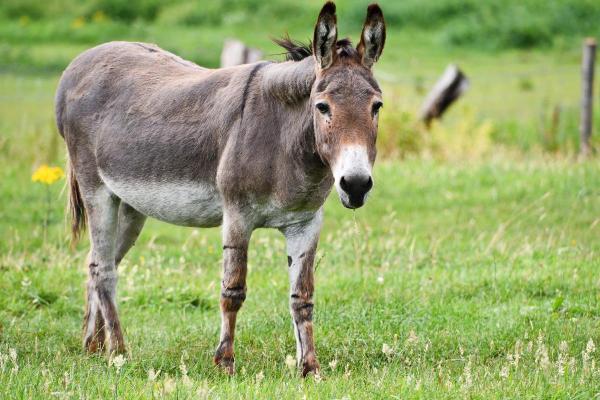How Long Do Donkeys Live?


Donkeys, with their endearing appearance and fascinating history, have been faithful companions to humans for millennia. These sturdy equines, descendants of the African wild ass, have played a crucial role in our agricultural and transportation systems. But have you ever wondered about the lifespan of these remarkable creatures?
In this article from AnimalWised, we explore the question of how long a donkey lives, as well as the factors that influence their longevity.
How long does a wild donkey live?
Wild donkeys, also known as African wild asses (Equus africanus), have an average lifespan of about 20 years in the wild. However, it's important to note that individual lifespans can vary based on various factors including environmental conditions, availability of resources, and predation pressure.
The relatively shorter lifespan of wild donkeys can be attributed to several factors. One of the primary reasons is the challenging and unpredictable nature of their natural habitats. Wild donkeys face a range of threats and pressures that can impact their survival. These include predation by carnivores such as lions, coyotes, and cougars, which can significantly impact donkey populations.
In addition to predation, wild donkeys often contend with limited access to food and water resources. They inhabit arid and semi-arid regions where food availability can fluctuate seasonally, leading to periods of scarcity. Lack of adequate nutrition can weaken the donkeys and make them more vulnerable to diseases and other health issues.
Human activities also play a role in influencing the lifespan of wild donkeys. Habitat destruction, caused by factors like encroachment, land development, and competition for resources, can disrupt their natural habitat and decrease their chances of survival. Moreover, conflicts with humans, such as poaching and capture for various purposes, can also pose significant threats to their population and lifespan.
While wild donkeys have adapted to survive in harsh environments, the combination of predation, limited resources, and human-induced pressures contributes to their relatively shorter lifespan compared to their domestic counterparts. Conservation efforts and initiatives aimed at protecting their habitats and managing threats are crucial for ensuring the long-term survival and well-being of wild donkey populations.
Conservation status of the wild donkey
The conservation status of wild donkeys, specifically the African wild ass (Equus africanus), is listed as "Critically Endangered" on the International Union for Conservation of Nature (IUCN) Red List of Threatened Species. This designation indicates that the species faces an extremely high risk of extinction in the wild.
Conservation efforts are underway to protect and restore wild donkey populations. These include habitat conservation, anti-poaching measures, and captive breeding programs to ensure the survival and genetic diversity of the species.
Do not miss this other article, where we explain what do donkeys eat.

How long does a domesticated donkey live?
Domestic donkeys (Equus asinus) generally have a longer lifespan compared to their wild counterparts. On average, domestic donkeys can live anywhere from 25 to 40 years, although some individuals have been known to live even longer.
There are several reasons why domestic donkeys tend to have longer lifespans. First and foremost, domestic donkeys are typically provided with consistent access to food, water, and veterinary care, which contributes to their overall well-being. They are often protected from natural predators and are not exposed to the same level of environmental challenges that wild donkeys face, such as scarcity of resources or predation.
Furthermore, domestic donkeys are not subject to the physical demands that can be placed on working animals in certain contexts. While they can still be used for tasks like carrying loads or pulling carts, their workloads are typically lighter and more regulated compared to historical or intensive agricultural practices.
The overall health and longevity of domestic donkeys also depend on other factors such as genetics, diet, exercise, and the quality of care they receive from their owners. Proper nutrition, regular veterinary check-ups, and appropriate shelter and living conditions all contribute to their well-being and can extend their lifespan.
It's important to note that these are general trends, and individual variations in lifespan can occur depending on specific circumstances and care. In the following sections, we will provide you with some tips and tricks to improve the life span of a donkey.
Do not miss this other article, where we explain what the differences between a donkey, a mule, and an ass are.
Recommendations to improve the quality of life of a donkey
Certainly, ensuring the well-being and quality of life for domestic donkeys is crucial. Here are some recommendations to improve their welfare:
- Provide adequate space: domestic donkeys are territorial, so they need ample space to move around and the option to be alone if they prefer. They should have access to large paddocks or pastures.
- Encourage social interaction: while donkeys are territorial, they also enjoy contact with other donkeys. Allowing them to socialize and interact with their own kind helps prevent anxiety and sadness.
- Support natural behaviors: donkeys find comfort and happiness in behaviors such as rolling on the ground, nibbling, and grooming each other. Provide them with opportunities and suitable environments to engage in these activities.
- Ensure resting areas: donkeys need to lie down to rest, so it's important to provide them with safe and comfortable resting areas where they feel secure.
- Promote exercise: donkeys have an innate need for movement, particularly when they are young. Encourage them to exercise and explore their surroundings, which helps in their muscle development.
- Provide balanced diet: donkeys are herbivores and spend many hours eating. They should have access to grazing or browsing areas with various vegetation options. However, monitor their food intake to prevent weight gain and maintain a healthy diet.
- Be attentive to behavior changes: although donkeys may appear strong, they can still experience anguish and pain. Watch for changes in behavior, withdrawal, or apathy, as these may indicate discomfort or distress.
- Maintain social bonds: if donkeys have formed pairs or groups, separating them can cause distress and even harm. Social contact is important to these animals, so maintain their companionships whenever possible.
- Ensure safe interaction with other species: be cautious when introducing donkeys to other species, including domestic animals, as conflicts may arise due to their innate defense instincts. Supervise their interactions to prevent injuries.
- Provide appropriate shelter: stables or shelters should be clean and spacious, allowing donkeys to lie down comfortably. However, they should also have access to outdoor areas during the day.
- Prevent wet and slippery conditions: avoid wet surfaces in stables or walking areas to prevent slips and falls, ensuring a safe environment for the donkeys.
- Consider pregnant donkeys: pregnant females may require isolation for their safety, but they should still be able to see and smell other donkeys to maintain social contact.
- Veterinary care: regular veterinary check-ups are essential for donkey health. Administer necessary vaccines to protect them against common diseases prevalent in domesticated donkeys.
- Avoid excessive workloads: it is recommended not to burden donkeys with heavy loads or excessive work. Avoid imposing weights that may cause suffering or discomfort to the animal.
By implementing these recommendations, we can ensure that domestic donkeys receive the necessary care and attention to lead healthy and fulfilling lives. To find out more, do not miss the following article, where we explore the main guidelines and basic care for a domestic donkey.

If you want to read similar articles to How Long Do Donkeys Live?, we recommend you visit our Facts about the animal kingdom category.
- AVEEE (2020). Guide to good animal welfare practices for the maintenance, care, training and use of donkeys and their hybrids . Available at: https://feeva.fve.org/cms/wp-content/uploads/Spanish-Donkey-Guide.pdf
- Moehlman, P.D.; Kebede, F.; Yohannes, H. (2015). Equus africanus . The IUCN Red List of Threatened Species 2015. Available at: https://dx.doi.org/10.2305/IUCN.UK.2015-2.RLTS.T7949A45170994.en
- Pagan, R. 2022. Equus asinus . Animal Diversity Web. Available at: https://animaldiversity.org/accounts/Equus_asinus/







